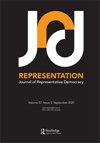政治不信任背后的政治理念:四种类型的反政治分析
Q2 Social Sciences
引用次数: 5
摘要
反政治已经成为分析不信任对自由民主政治影响的一个重要概念。但是,民主主义者为什么要相信那些不相信政治的人,让他们帮助他们更新民主主义,这是不清楚的。本文通过定义四种类型的反政治来解决这个难题:技术官僚、精英主义、民粹主义和参与性。然后,它比较了与每种类型相关的四位民主思想家的政治思想,以辨别他们对代议制民主的“生产性”或“非生产性”程度。本文认为,参与式和技术官僚式的反政治,以卡罗尔·帕特曼(Carole Pateman)和弗里德里希·哈耶克(Friedrich Hayek)的思想为例,在较小程度上,对代议制民主是有益的,因为它们促使人们反思代议制机构的运作方式。相比之下,以埃内斯托·拉克劳(Ernesto Laclau)和约瑟夫·熊彼特(Joseph Schumpeter)的思想为例的民粹主义和精英主义类型的反政治则成效较低。这篇文章的结论是,学者们需要仔细辨别民粹主义和技术官僚的“解决方案”背后的逻辑,以应对我们当代的民主危机,因为这些解决方案本身可能会被“假朋友”所倡导,他们不知道什么应该被视为“专家知识”或“民意”的理想来源。本文章由计算机程序翻译,如有差异,请以英文原文为准。
The Political Ideas Underpinning Political Distrust: Analysing Four Types of Anti-politics
ABSTRACT Anti-politics has emerged as an important concept for analysing the effects of distrust on liberal democratic politics. However, it is unclear why democrats should trust individuals who distrust politics to help them in renewing democracy. This article addresses this puzzle by defining four types of anti-politics: technocratic, elitist, populist and participatory. It then compares the political thought of four democratic thinkers associated with each type, to discern the extent to which they are ‘productive’ or ‘unproductive’ for representative democracy. The article argues that participatory and technocratic types of anti-politics, illustrated by the thought of Carole Pateman and, to a lesser extent, Friedrich Hayek, are productive for representative democracy because they prompt reflexivity in how representative institutions work. By contrast, populist and elitist types of anti-politics, illustrated by the thought of Ernesto Laclau and Joseph Schumpeter, are less productive. The article concludes that scholars need to carefully discern the logic underlying populist and technocratic ‘solutions’ to our contemporary democratic crisis because those solutions can themselves be advocated by ‘false friends’ who are unreflexive about what should be considered ideal sources of ‘expert knowledge’ or ‘popular will’.
求助全文
通过发布文献求助,成功后即可免费获取论文全文。
去求助
来源期刊

Representation
Social Sciences-Sociology and Political Science
CiteScore
3.50
自引率
0.00%
发文量
31
期刊介绍:
This change in scope follows two paths. Firstly, it seeks contributors who are interested in exploring the interface between democratic practice and theory. In particular, this focus seeks contributions that apply theoretical insights to actual examples of current practice. Secondly, while not neglecting the current focus of the journal, we would like to expand its international coverage so that the journal will offer our readers insights in the state of democracy worldwide.
 求助内容:
求助内容: 应助结果提醒方式:
应助结果提醒方式:


